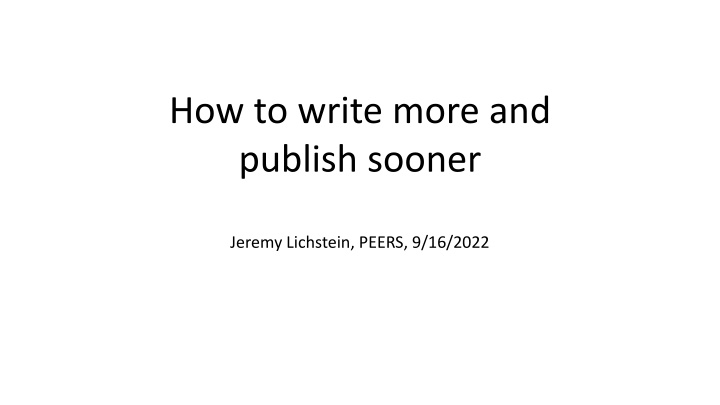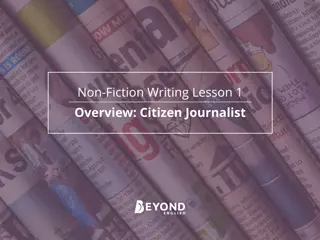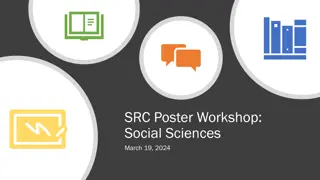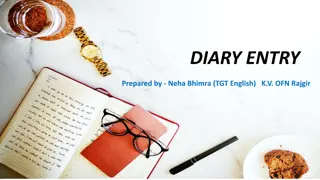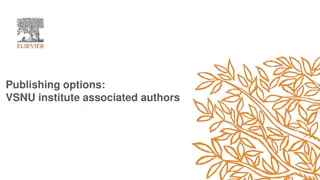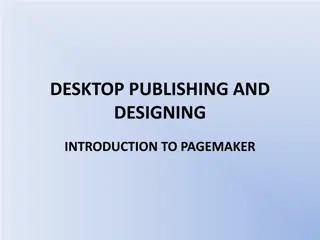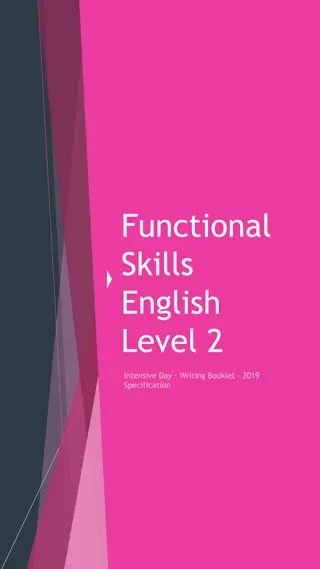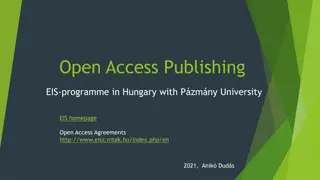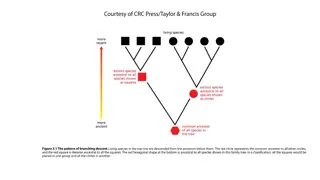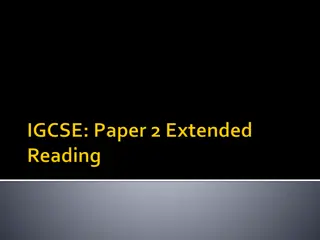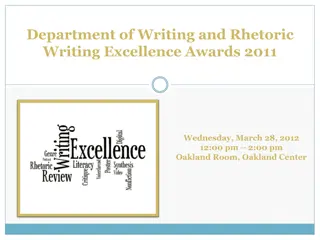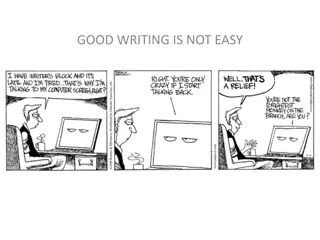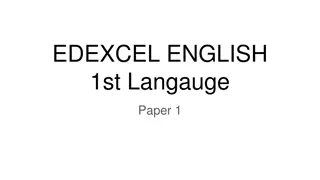Tips for Efficient Writing and Publishing
Enhance your writing skills, understand the importance of concise writing, organizing your paper effectively, and editing tricks to improve your productivity. Manage your time efficiently to write more consistently.
Uploaded on Feb 19, 2025 | 1 Views
Download Presentation

Please find below an Image/Link to download the presentation.
The content on the website is provided AS IS for your information and personal use only. It may not be sold, licensed, or shared on other websites without obtaining consent from the author.If you encounter any issues during the download, it is possible that the publisher has removed the file from their server.
You are allowed to download the files provided on this website for personal or commercial use, subject to the condition that they are used lawfully. All files are the property of their respective owners.
The content on the website is provided AS IS for your information and personal use only. It may not be sold, licensed, or shared on other websites without obtaining consent from the author.
E N D
Presentation Transcript
How to write more and publish sooner Jeremy Lichstein, PEERS, 9/16/2022
What does writing mean? Writing means writing words for your paper (main text, figure captions, supplements, etc.), grant proposal, dissertation proposal, etc. (basically, writing words that are critical to advancing your career). For PIs (e.g., faculty), editing papers led by your advisees can count as writing if you will be the senior author. Analyzing data, making figures, reading literature, etc., are also necessary. But these activities do not count as writing as defined here.
Scales of writing Sentence Be clear and concise. Every word should serve a purpose. A classic reference is The Elements of Style by Strunk and White ($4.42). Paragraph Topic Sentence Supporting Sentences: These should support/explain/elaborate on the Topic Sentence. Try not to introduce new topics; those should go in a different paragraph. Concluding/Transition Sentence: Summarize the key point of the paragraph and/or provide a logical transition to the next paragraph. (Most paragraphs have a concluding/transition sentence, but this is not a strict requirement.) Paper Organize your paper around a set of questions/hypotheses. There should be a clear and direct link between the last paragraph of Intro (the Road Map) and the Results section. The Baldwin Formula for Scientific Writing (which you can find online) has some useful ideas. The context and key results/conclusions should be clear from reading only the Topic Sentences of each paragraph. If the story is not comprehensible from just the Topic Sentences, consider how you might revise or rearrange these sentences (and the associated paragraphs).
Tricks to help you edit your own writing The key to editing your own writing is to be able to see it with fresh eyes. Some tactics that might help: Let it rest for a week or more. Then come back to it. Change the font, font size, and/or margins so that the words and pages look different (e.g., by changing the number of words per line). This can help you actually read each word (rather than skimming over them, because you think you know what s there). Convert your text editor document to a pdf. Then, read the pdf version. [I have no idea why this works, but I often find problems in my pdf versions that I missed in Word.] Read the words out loud. These ideas are largely based on advice in the Baldwin Formula.
Managing your time the Write Way What percent of your work-days include at least 20 minutes of writing? Aim to write at least 20 minutes in at least 50% of your work-days. A reasonable goal is 100%. How many days of the week do you write? Try to write at least 20 minutes, 5 days a week. What is the minimum block of time you use for writing? Aim for 20 minutes or less. You can do 5 minutes! Do you binge write ? Writing frequently in small blocks of time is better. Frequent writing leads to shorter start-up time (i.e., less time wasted trying to remember what you are doing), more positive energy (accomplish a small goal each day!), and more potential writing time (the smaller time-block you are willing to use, the more of your calendar becomes available for writing). Binge-writing leads to longer start-up time (because binge-writing is typically infrequent) and is often associated with unrealistic goals (e.g., I am going to finish writing my paper today ). Do you schedule time for writing in your calendar? You should. Every day. At what stage in a project should you begin to write? You can write at any stage of a project, even if you do not yet have data.
Benefits of writing early and often Helps organize your thoughts. Clarify the questions, predictions, key results, etc. Document your methods (before you forget important details). Engage coauthors (get feedback, help, etc.). Easier to revise than to write from scratch. You may as well get started, and practice along the way!
The Baldwin Formula for scientific writing Ian T. Baldwin The most efficient way to write scientific papers is to write while you are still conducting experiments, for it is only when you put the conclusions that you want to draw from your experimental data on paper that you will be able to see the flaws in the argument, the missing controls, or realize, from placing your work in the context of the published literature, what a better experiment would have been. So the process of writing should be viewed as being inexorably linked with the experimental process. I consider writing as a type of scientific oral hygiene, something you should do every day, like brushing your teeth. And if you make this a habit, then the process becomes much less painful.
A critique of the Baldwin Formula Lot s of great advice. But in my opinion, Baldwin is too focused on: Efficiency: Write the MS elements in a certain order to avoid re-writing, which Baldwin considers a waste of time. Abstract, Figures, and Tables: Baldwin views these as the key elements of a MS, from which everything else flows. I suggest that: Two other critical MS elements are the Road Map (questions) and the Results Sentences (answers): Road Map: This is typically the last paragraph of Intro and often begins, In this paper, we This paragraph lists your questions, hypotheses, etc. Results Sentences: Your key results, written in complete sentences. These can be (should be?) the topic sentences of the paragraphs in your Results section. There are 5 key MS elements: Abstract, Figures, Tables, Road Map, and Results Sentences. Draft these in any order you want. This will probably be an iterative process. Once you have a draft of these 5 elements, get feedback from your coauthors. Don t worry too much about efficiency. Writing, re-writing, re-writing, is not a waste of time.
The start-up-time problem Start-up-time is the amount of time between: (1) when a writing session begins and (2) when writing becomes productive Write often Easy recall Short start-up Efficient use of time Write infrequently Slow recall Long start-up Inefficient use of time
Writing Retreats Pros Reserve time for writing Few distractions Good for the PI Collaboration Access to PI Cons Long start-up time if writing is infrequent Encourages binge writing (rather than frequent writing) Leads to unrealistic goals ( I am going to finish my paper at the retreat! ) Not useful for all people
Why do some researchers publish so many papers? The most prolific authors write frequently and in any block of time (small or large): during scheduled blocks of time, between meetings, while waiting for a plane, after a long day of field work, etc. Are they prolific authors because they write often? Write often in any block of time High rate of publication Or do they write often because they are good writers, which makes writing easy and enjoyable? Being good at writing Writing is enjoyable Write often in any block of time
Actions you can take Set goals. You should be in control of the outcome. An outcome you can control: I will write at least 30 minutes each day this week. An outcome that may be out of your control: I will finish my manuscript this week. Schedule writing time in your calendar. Keep a writing log: At the end of each day, record how many minutes you spent writing. Join forces with a writing buddy: At the end of each day (week, etc.), report to your buddy how many minutes you spent writing.
